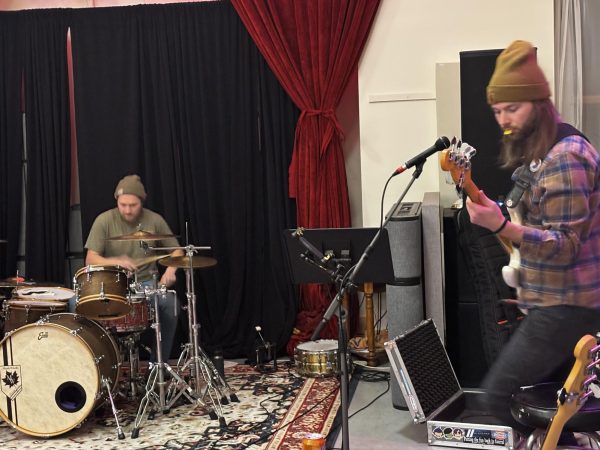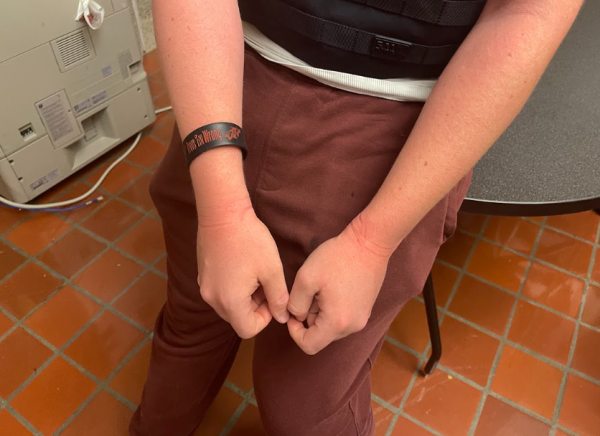Posted on 03 January 2025.
Riding on a black and blue bike through Dinkytown, spokes lined with Christmas lights and a large Bluetooth speaker on his back blaring music, Jacob Williams, known by friends as Beetlejuice, heads to Royal Cigar and Tobacco to hang out and listen to music. When not on his bike or blasting tunes, Williams spends his time fixing up other bikes or rebuilding speakers out of spare parts.
Williams, 45, is a prominent member of the homeless community in Dinkytown. At least he was until he moved into the Higher Ground Minneapolis Shelter in 2022. Williams said he was homeless off and on for over 10 years and lived in Dinkytown for about five of those years.
One of the things people do not understand about homelessness is how close they are to experiencing it, Williams said.
“They’re only one missed rent payment away from being living on the street,” Williams said.
Stigma and misunderstanding
Riley Molitor, a street outreach worker with Agate Housing and Services, a homelessness advocacy group and shelter, said people experiencing homelessness face unfair judgment.
“The general population doesn’t really get that people are struggling, like day to day, that none of our clients want to be out there,” Molitor said.
Williams said he assumed most people thought he was a scourge because he was homeless and was surprised when people in Dinkytown were happy to see him. He said he always tried to make the places he went better than how he found them by picking up trash — even scavenging some of it — and some people took notice.
Often, the meals he ate while homeless in Dinkytown were better than the ones he eats now, Williams said.
“Some lady, once a month at least, she’d make a nice home-cooked meal and then bring me a big helping of it,” Williams said.
Building Trust
In harsh Minneapolis winters, the battle with homelessness gets far more complex. Housing and outreach remain primary focuses during this time.
Anvis Aryavong, program manager for Agate Housing and Services, said Agate’s main goal is to provide housing solutions for people experiencing homelessness.
Agate received $1.5 million from the Minneapolis City Council in September to renovate housing and keep its Minneapolis facility from closing down, the Minnesota Daily reported.
Molitor and Aryavong were both homeless at one point and said their lived experience helps them understand what the people they work with are going through. He said around half the people working at Agate were homeless at some point.
“I was a homeless youth, and I didn’t know anything about this field, really, until I had my case manager,” Molitor said. “And she made me be like, ‘I want to do what she does.’”
Aryavong said people do not always know the housing resources they have at their disposal.
“I see how much is out there for the folks who are homeless,” Aryavong said. “But when I was out there, I was very transient. I moved around a lot. Although I did stay at an encampment, I didn’t spend all my time there. So, when services would come through, every now and then, I was just not there.”
Aryavong said another barrier to providing services to people experiencing homelessness is trust. He said he tries to remain casual when interacting with people in the field to not seem like he is forcing anything onto anyone.
One of the most important aspects of building trust is proving reliability through consistency, Molitor said.
“A client was like, ‘I want some Danishes.’ And so we went and got her some Danishes, and brought those next week,” Molitor said.
Securing Housing
The most general income assistance a single person with no income can receive in Minnesota is $203 a month, according to the Minnesota Department of Human Services. The average yearly cost of living for a single person aged 19 to 50 in Hennepin County is $36,990, according to the Minnesota Department of Employment and Economic Development.
Soren Steveson, a street outreach worker with Agate Housing and Services, said the gap between general assistance and the cost of housing means anyone without another source of income must go through a long process to find a place to stay.
It can take four to six months to house someone and varies based on Coordinated Entry, which assigns a need value to people applying for housing and pushes those with the highest level of need up the list, according to Molitor. Need is largely based on time spent homeless and medical fragility.
“There’s very, very few other ways for you to get a place to stay,” Steveson said.
Oftentimes, people experiencing homelessness do not look for housing until the weather starts to chill, making it more difficult to find shelter for everyone requesting it, according to Maikao Vue, manager of the Minneapolis Homelessness Response Team.
The Minneapolis Homelessness Response Team spends most of their time in the field connecting with people experiencing homelessness, Vue said. They run into fewer people in the winter because more people seek shelter.
Aryavong said he tries to discuss securing housing with people in the spring before they start scrambling for shelter as the weather turns frigid.
“It’s getting warmer now, and you’re going to get comfortable, but remember, it’s going to get cold again like it does every year,” Aryavong said. “So, let’s get the ball rolling before we have to do this all over again.”
Stevenson said there is a chasm between those who are more casual about securing housing and those who take it more seriously.
“For people that really want housing, we can’t house them fast enough, and for people that want housing less, we house them too quick,” Stevenson said.
When he first became homeless, Williams loved it, he said. However, the freedom he found early on didn’t keep him satisfied forever.
Molitor said most of the people she works with have some form of disability, which hinders their ability to find a job or housing.
“It’s no fault of their own, but having a job isn’t feasible, you know,” Molitor said. “They need services and help and assistance that a lot of people don’t really comprehend if they haven’t been exposed to the world of disability.”
Estimates vary on how many people experiencing homelessness struggle with disability and mental illness, but according to a 2023 report from the U.S. Department of Housing and Urban Development, 31% of the homeless population are chronically homeless. Chronic homelessness, as defined by the report, refers to anyone with a disability who has been continuously homeless for a year or more or has been homeless for at least four extended periods of time over the last three years totaling 12 months or more.
According to the HUD report, 24% of homeless Minnesotans fall under the category of chronic homelessness.
It is almost impossible to be homeless for an extended period of time without developing some form of disability or long-term injury, according to Molitor.
Life after homelessness
Williams said he sustained life-altering injuries while he was homeless, including a brain injury from being assaulted with a crowbar and frostbite on the soles of his feet. He added he has suffered from seizures since he was a child, but the head injury and his resulting hypoglycemia diagnosis worsened them.
Williams said he can no longer do a lot of the things he used to because of his injuries. He said he spent some time as a tattoo apprentice in Chicago when he was 18, but he can no longer draw as well as he used to. He used to compete in BMX competitions, but after his head injury, he can barely turn 180 degrees while standing without falling over.
He even considered getting into stand-up comedy at one point, but now he struggles to remember words, though he did not stop telling jokes.
“Humor is, like, beyond the most important thing in my life,” Williams said. “That’s what keeps me going.”
In fact, he still bikes, though not as intensely as he used to, and though he does not draw much anymore, he still has his work fixing up old bikes and crafting speakers.
Despite the injuries and his struggles while homeless, Williams said he is still grateful for where he is in life.
“I thank God for letting me see another moment,” Williams said. “I did it religiously for the first couple years after my head injury, like every time my eyes would close, I’d be like, ‘Thank you, God.’”


